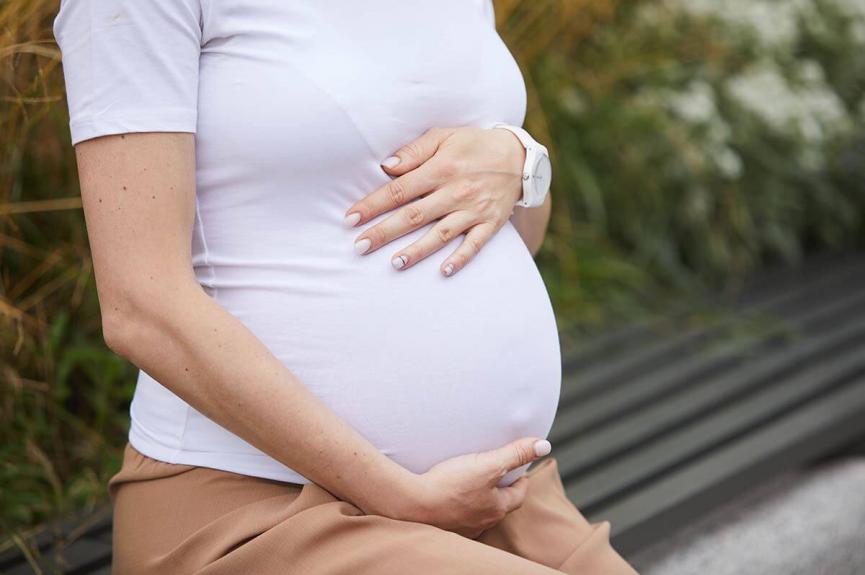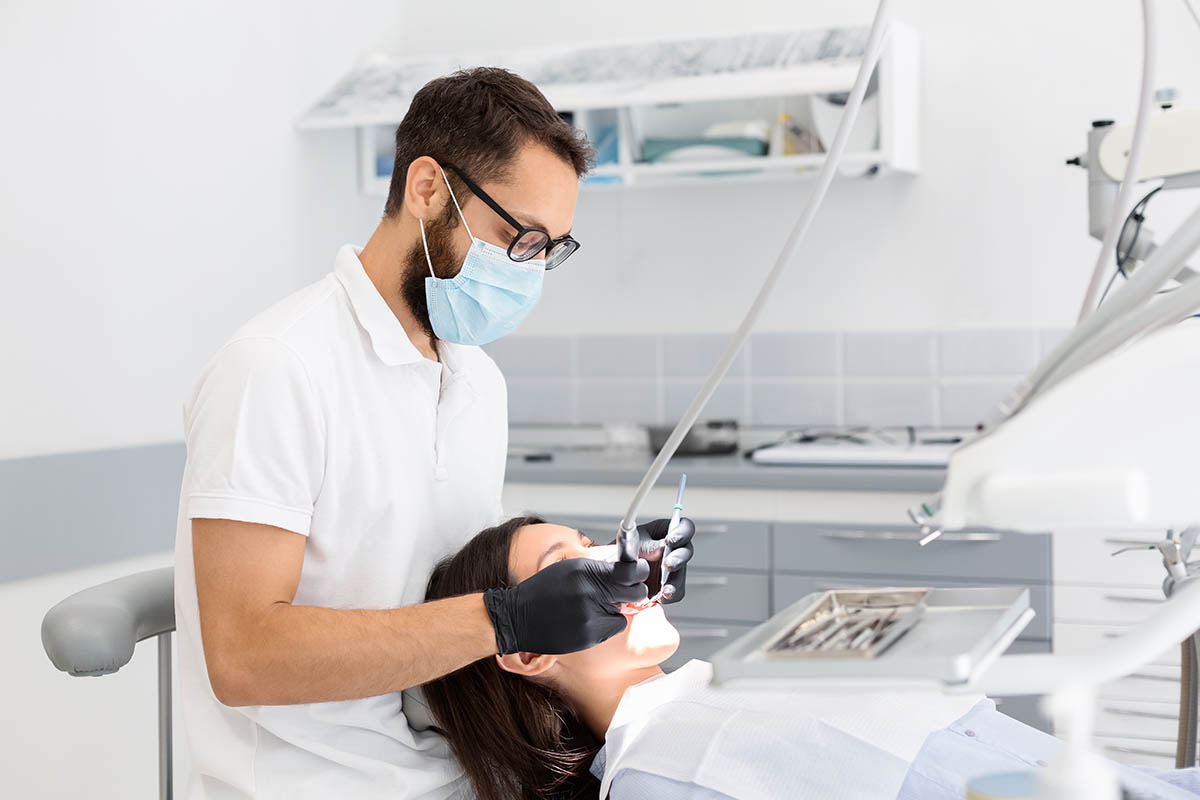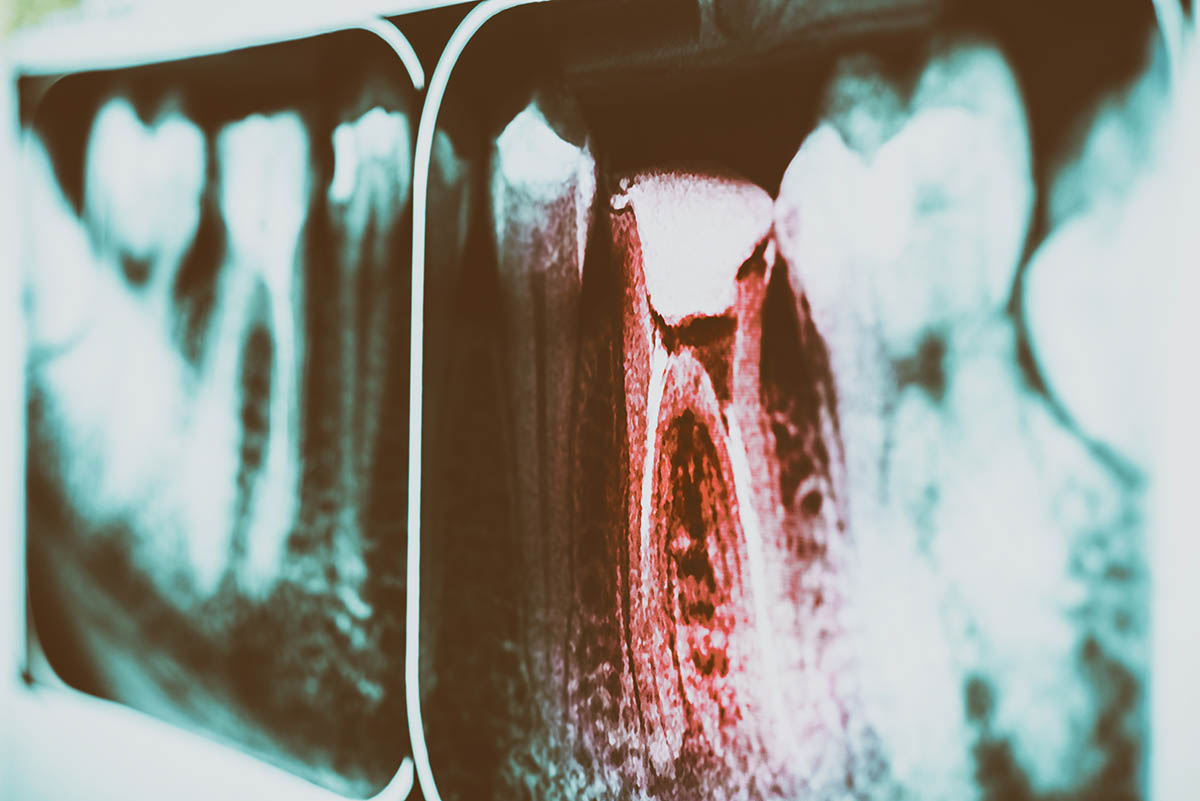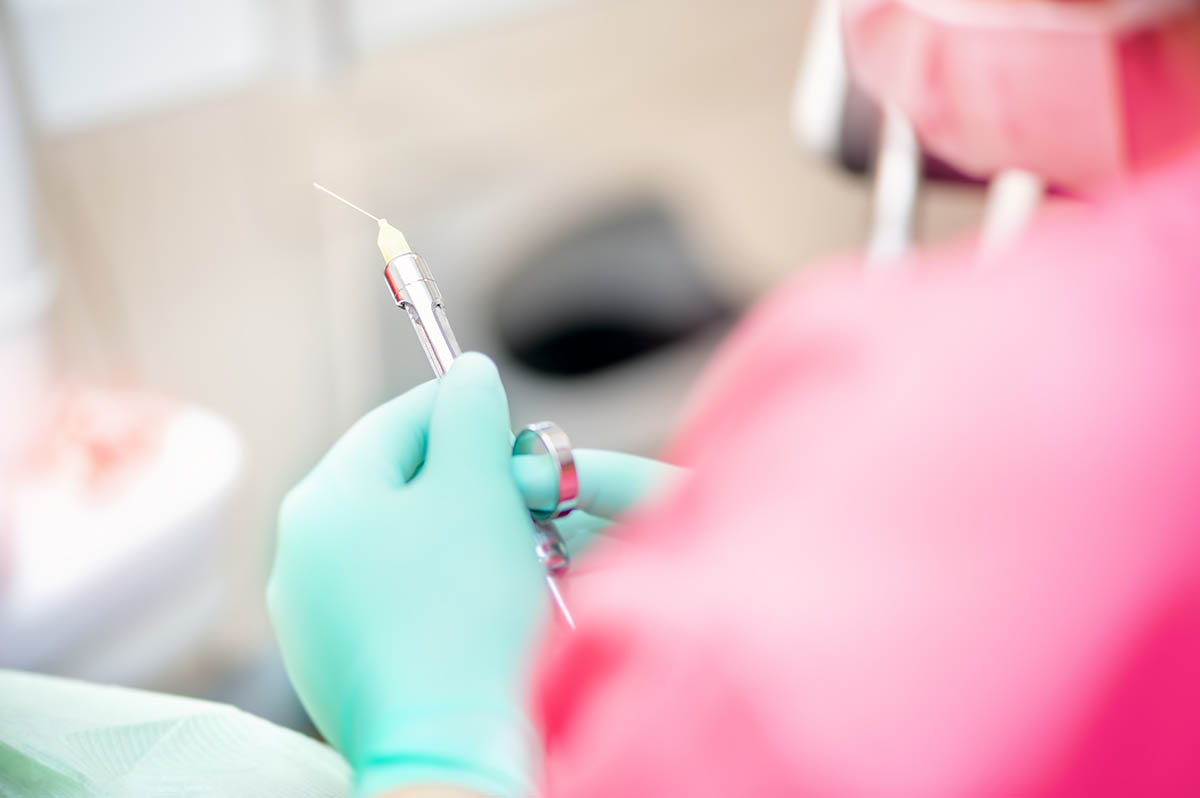
What do a dentist and pregnancy have in common? You will be surprised to learn how much one can affect the other, and vice versa. Pregnancy can cause certain issues with your teeth while undergoing dental treatment during that vulnerable time in your life isn’t always advised. Yet, leaving such problems to thrive is not an option either.
Let’s be clear on this. If you are willing to conceive, it pays to sort out any dental health problems in advance so you create the perfect conditions for your baby to develop. It will also give you the peace of mind that you don’t have to deal with them while you are expecting. That's the best-case scenario we're talking about. Gum and dental disease can affect your baby 1.
However, even if your teeth are in a great state prior to pregnancy, chances are hormonal changes will give rise to other dental issues along the way. Sometimes they can cause pregnancy gingivitis, tooth decay, tender gums that bleed easily, and other problems such as pregnancy tumours. So, you want to keep everything to a minimum.
In this article, you will find out the impact that pregnancy can have on your teeth and how to tackle it together with a trusted dentist. Stay tuned.
Tooth decay during pregnancy
As mentioned in the intro, during pregnancy, hormonal fluctuations may have their toll on your dental health. And dental health is a window to your overall health. It may change how your body reacts to plaque. It’s like morning sickness and food cravings aren't enough, but you become susceptible to so many things, including a prevalence of bad bacteria on your pearly whites.
Why does this happen? Hormonal changes in the body are capable of increasing your blood flow by up to 80%. Spikes in progesterone and oestrogen can expand the blood vessels in the mouth, which results in sensitive gums and other dental concerns. This in turn causes them to bleed easily, spurring something called pregnancy gingivitis.
Adding the fact that acidity in the mouth increases greatly in the first trimester, mostly because of morning sickness, and you get is a recipe for dental issues all throughout your pregnancy. Here are some tips to follow to make the journey less stressful:
- Reach out to your dentist as soon as you notice a problem. You should still see a dentist or dental hygienist regularly to make sure you maintain good oral health. Some problems are not so obvious at first and only an educated and experienced physician can detect them. In other words, annual exams and prenatal dental care are crucial.
- Do not brush your teeth right after pregnancy morning sickness. The best way to go about this is to rinse your mouth with plain water to remove any residue from your teeth and decrease the level of acidity in the mouth. You may also add a tablespoon of baking soda. It will interfere with the stomach juices, reducing the risk of tooth decay. If you still want to brush your teeth after that, wait for at least an hour to pass (this will also relieve your gag reflex). A fluoride mouthwash will also work wonders.
- Floss once or twice a day to make sure you get all the food in between your teeth. Interproximal cavities are pretty commonplace. Good oral hygiene should be your top priority. Or else, you may suffer from gum disease and other oral health issues that affect both pregnant women and everyone else.
- Consume more dairy products to increase your calcium levels and keep the bone structure in good condition. Your doctor might suggest supplementing some vitamins and minerals. Additional procedures may be ordered.
Keep in mind that the problems resulting from bad bacteria in your mouth might cause preterm birth, low birth weight, a thing called pregnancy gingivitis that we already mentioned before, and more. When this happens, dental care procedures should be in place right away. You don't want to get to a point in which you need root canal treatment or other complex manipulations.
Dental fillings during pregnancy

It is perfectly okay to have a dental filling placed during pregnancy as long as you tell your dentist that you are expecting. The treatment will improve your oral hygiene and prevent disease. You should not worry about that. When it comes to the filling material, you should definitely go for white over amalgam fillings. According to different studies, having white fillings does not increase the risk of birth defects as opposed to not going to the dentist at all 2.
If you develop a bad cavity during pregnancy, you have no choice but to treat it before it gets so bad it transforms into an infection. This will not only save your tooth, but also reduce the risk of gum disease (periodontitis) and keep your baby safe. Certain dental problems can lead to premature birth.
You probably have a lot of questions concerning the procedure and the use of local anaesthetic during pregnancy. Your dentist will be able to answer all of them. Should you choose to have a pain-free treatment, you could go for it. Lidocaine is thought to be safe during pregnancy 3. In general, it can reach the placenta but it doesn’t have a direct impact on the baby.
Other than that, the entire treatment is similar to what you have experienced so far pre-pregnancy. You will have to spend some time on the chair while the dentist is doing all the work.
Now, this is not to say that amalgam fillings are a bad idea but it’s advisable that you avoid them. There is no evidence that the small amounts of elemental mercury vapour they release have adverse effects on the baby but it’s best to stay on the safe side. And what if you have an amalgam filling that you would like to remove? Same rule applies. You should wait until you give birth.
What can a pregnant woman take for a toothache?
If you experience toothache during pregnancy, you will probably be reluctant to take oral painkillers for the sake of your unborn child. What you can do is try some at-home methods that both your gynaecologist and dentist will approve of.
- Garlic. For example, you could apply garlic over the affected area. The antimicrobial properties of its amino acid named allicin will help mitigate the discomfort. It doesn’t have side effects and it is absolutely safe during pregnancy. All you have to do is peel a clove and chew it for some time or let it sit over the problem tooth.
- Pomegranate. Another natural antibiotic, pomegranate is a great way to keep dental plaque and pain at bay. Because it can kill the bacteria that cause infections and therefore pain, you can use the fruit to deal with your toothache. 30 ml of juice will be just enough to prevent and manage these problems. Rinsing your mouth with pomegranate on a daily basis will give you consistent results.
- Baking soda. Every household has at least some baking soda lying around and it can be put to good use during pregnancy. As you know, the first trimester of pregnancy brings about morning sickness and vomiting. This causes the acids from the stomach to travel up the oesophagus and reach the throat. From there, they can easily seep into the teeth. If this happens all the time, it may strip away the enamel. What will help with the problem is swishing your mouth with baking soda and water or dabbing it directly onto your toothbrush prior to brushing your teeth and gums. It’s a great remedy for toothache. It may promote good dental care habits as well. Last but not least, it will help with morning sickness during pregnancy.
- Aloe vera. Other than antibacterial function, aloe vera is known for its antimicrobial and antifungal effects. In other words, it helps to reduce swelling and inflammation in the gums which is so common during pregnancy. It may also reduce the odds of getting gum disease as long as it is coupled with good oral health practices and on-time treatment whenever health problems do arise.
X-ray when pregnant & dental issues

You will hear different stories on whether pregnant women should have dental X-rays during pregnancy. While the screening test technically does not affect the abdominal area, there is always a risk of one of the beams hitting random places in the body. This is why medical staff places lead aprons and shields over the risky area to protect it from getting radiation. However, this does not guarantee 100% safe outcomes. The general assumption is that if it can be postponed, then you should leave it for after delivery 4.
Of course, if the problem is severe and it cannot wait, you will have no choice but to undergo dental X-rays. In that case, you should by all means make your dentist aware of your situation. Follow all instructions precisely and don’t worry about the details. Modern dental X-rays expose pregnant women (and other patients) to lower doses of radiation and are considered safe.
Can you get braces while pregnant?
Women who are expecting can have braces but there are a few precautions to take. As a general rule, unless it’s absolutely necessary, there is no need to take care of that matter during pregnancy. But if you are concerned about the appearance or if your dentist thinks it will be better for your overall oral health, then you should go about it.
Now, which type of braces is best for pregnant women? Without a shadow of a doubt, invisible braces like Invisalign will pose less risk to your gum health. Having piqued patients' interest, they are easy to clean and you can take them out during meals.
With traditional braces, a woman should avoid certain foods like popcorn, crunchy foods, nuts, hard meat, sticky candy, and ice, among other things. Not to mention, more religious dental care is advised. Considering that this is a special time in your life where you should do your best to eat a diverse diet, it may be a problem that you have to cut down on so many different foods.
For minor tooth alignments, your best bet would be retainers. Because hormone changes can loosen teeth, it is important that you and your dentist discuss your treatment plan carefully, taking into consideration all these things. That's not to say that pregnancy will for sure ruin your teeth. In most cases, you will navigate through your third trimester without a care in the world. But you need to be mentally and physically prepared for what is coming. Knowing the facts (especially about the role of hormonal changes to your oral health) will help you manage the risks more efficiently.
No matter which option you go to, you have to make regular trips to the dentist’s office to get checked up.
Tooth extraction while pregnant
It is not recommended to have a tooth removed during pregnancy because it will cause too much stress and pain to the body, which will eventually affect the foetus. That being said, if the situation calls for an immediate intervention due to an infection or another serious dental issue, the procedure should definitely be up for consideration. An untreated infection will potentially cause more harm in women and has to be eliminated as soon as it is spotted.
Here are a few signs to watch out for that may indicate the need to extract a tooth:
- Bleeding gums
- Inflamed and swollen gums
- Infection in the tooth
- Tooth decay
- Throbbing pain in the affected area
- Trouble speaking
Other than a stressful experience for the entire body, tooth extraction is not a good idea on many other levels. For starters, you will have to undergo X-rays, which are not safe for the baby. A lead collar and apron should be employed during the screening as a precaution. Another problem is anaesthesia. Local anaesthetics will be administered to the targeted area to keep the patient from feeling pain but it can have adverse effects on the baby. The solution is to use category B drugs which are said to be flushed out of the placenta prior to getting to the baby.
That’s why good oral hygiene is essential before, during, and after pregnancy. It will lower your chances of gum disease, tooth infection, and a dead tooth, among other things.
Here is when a dentist can safely perform tooth extraction procedures to a woman during pregnancy:
Tooth extraction during pregnancy: first trimester (not recommended)
The first weeks of the development of your baby are nothing but essential, as this is the time at which birth defects are most common. For this reason, you should hold off on dental procedures at all costs. If you are having an issue, home remedies will be the best alternative unless your physician orders otherwise. Don’t automatically assume that if you experience an issue, you should keep it to yourself and wait for it to sort out on its own. You ought to still go to the dentist as soon as you can to see what they can do about it.
Tooth extraction during pregnancy: second trimester (recommended)
By the time you reach the second trimester, your baby will have developed all its vital organs, so it’s safe to perform a tooth extraction treatment if such is necessary. During the procedure, pregnant women may experience a drop in blood pressure known as Supine Hypotension Syndrome. This happens because the baby puts a lot of pressure onto the inferior vena cava (a vein) when you are seated. To fix that, the dentist may try to keep your hip elevated on the chair at about 12 cm.
Another problem that may occur is dizziness and even a temporary loss of consciousness. In this case, the dentist may want to turn you on your left side. After you pass six months, things will be different, though.
Tooth extraction during pregnancy: third trimester (not recommended but could be performed if it’s unavoidable)
Once you reach the final stage of your journey, i.e. the third trimester, your dentist will discourage you from having tooth extraction or other serious dental procedures, as this may lead to premature birth. You will not be able to stay seated for a prolonged time and this will be a further annoyance. Unless you are dealing with a debilitating pain, it’s best to wait until after delivery to get the job done.
Teeth cleaning while pregnant
It is possible and, in fact, recommended that women continue with their dental cleaning sessions well into their pregnancy. It will help to keep your gums healthy and prevent periodontal disease/periodontitis. Dental procedures like this one will pose no harm to your body during pregnancy. Having said that, you should not forget to inform your dentist of your pregnancy status and mention how far along you are so they figure out if it is the right time to undergo the dental treatment. Always trust a medical professional for these kinds of concerns and you will be fine.
Even though teeth cleaning is not harmful, the dentist may still want to avoid carrying it out during the first or third trimester. The second trimester is always the most preferred option. This coupled with proper brushing techniques and a good mouth rinse will prevent more serious issues from developing.
Is local anaesthetic safe during pregnancy?

So far, there has been no evidence that local anaesthetics for dental treatment can increase the risk of birth defects or complications in pregnant women. However, research on this topic is lacking. Several studies suggest that pregnancy outcomes are not negatively impacted by dental work.
In a study, pregnant women were divided into two groups: one group was treated with local anaesthetics and the other wasn’t. A while after the trip to the dentist was over, results showed no change in complication rates or birth defects. It is important to mention that 53% of the participants were in their first trimester which is when the majority of birth defects occur.
Although the study is not definitive, it shows there is no proof that dental treatments can cause problems to the baby or the mother. In fact, women are strongly encouraged to take care of their teeth and gums all throughout their pregnancy because oral problems might affect the safety of the foetus, increasing the incidence of preeclampsia, geriatric diabetes, and premature birth.
Aside from your dentist, a gynaecologist will advocate dental treatment too, especially if it cannot wait. They do raise awareness about the proper dose to use, though.
What are pregnancy tumours?
Don't be alarmed - pregnancy tumours are just swelling of the gums, usually between the teeth, they are not mouth cancer. The overgrowth of tissue is usually noticed in some women in the third trimester. One of the causes is the presence of a lot of plaque. They can bleed rather easily and are characterized by a red colour similar to a raspberry.
Pregnancy tumours usually disappear on their own after childbirth 5. If you are worried, you can tell your dentist about them and discuss ways to remove them before that.
Medication during pregnancy
During and after your dental appointments, you may have to take medication. Although this is not a good idea altogether, sometimes it’s inevitable. Drugs that are fairly safe to use include amoxicillin, codeine, clindamycin, hydrocodone penicillin, and some non-steroidal anti-inflammatory medications (short-term use only). Please note that some of these should only be employed during the second trimester (before you reach the end of six months). For the safest practices, always consult a specialist before you down any of these.
Medicines that a pregnant woman should definitely steer clear of include thalidomide, moxifloxacin, ciprofloxacin, doxycycline, tetracycline, levofloxacin, and micocycline.
Tooth infection and pregnancy
The best way to avoid gum infection is to see a dentist every once in a while, brush your teeth twice a day, and try to address any issue as it arises. Do not wait for the problem to become worse because it may be dangerous to you and the baby. Infections can be treated if detected on time but this will involve a wide range of antibiotics and other medication, which pregnant women should stay away from.
If you don’t tackle dental care problems quickly, they require more complex interventions like root canal treatment, tooth extraction, dental implants, etc.
Teeth whitening during pregnancy
Now, just like the other treatments, you can have your teeth whitened by a dentist during pregnancy. The question is, is it that urgent an issue that you are not willing to wait another few months to have it done? Teeth whitening is a cosmetic, and therefore elective, procedure. Unless it is medically necessary, you really shouldn’t carry it out during pregnancy. All you should strive for is taking optimum care of your oral health - that is, the things that may actually create a problem during pregnancy - rather than increasing your risk. Ask your dentist for more details.
- 1. https://www.betterhealth.vic.gov.au/health/HealthyLiving/pregnancy-and-t...
- 2. https://www.ncbi.nlm.nih.gov/pmc/articles/PMC6103982/
- 3. https://www.ncbi.nlm.nih.gov/pmc/articles/PMC5564152/
- 4. https://www.nhs.uk/conditions/pregnancy-and-baby/teeth-and-gums-pregnant/
- 5. https://www.mouthhealthy.org/en/pregnancy/concerns







